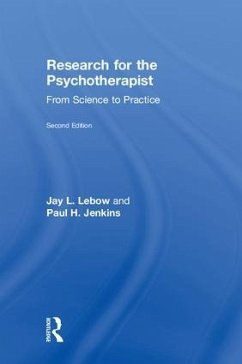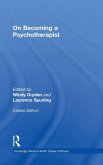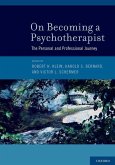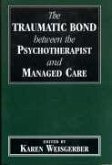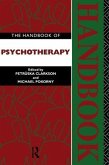- Gebundenes Buch
- Merkliste
- Auf die Merkliste
- Bewerten Bewerten
- Teilen
- Produkt teilen
- Produkterinnerung
- Produkterinnerung
This fully revised and expanded edition of Research for the Psychotherapist is an engaging, accessible guide that bridges the gap between gathering, analyzing, presenting, and discussing research and incorporating that research into practice.
Andere Kunden interessierten sich auch für
![Integrative Therapy Integrative Therapy]() Maria GilbertIntegrative Therapy153,99 €
Maria GilbertIntegrative Therapy153,99 €![On Becoming a Psychotherapist On Becoming a Psychotherapist]() On Becoming a Psychotherapist163,99 €
On Becoming a Psychotherapist163,99 €![Contemporary Body Psychotherapy Contemporary Body Psychotherapy]() Linda Hartley (ed.)Contemporary Body Psychotherapy163,99 €
Linda Hartley (ed.)Contemporary Body Psychotherapy163,99 €![On Becoming a Psychotherapist On Becoming a Psychotherapist]() On Becoming a Psychotherapist91,99 €
On Becoming a Psychotherapist91,99 €![Traumatic Bond Between the Psychotherapist and Managed Care Traumatic Bond Between the Psychotherapist and Managed Care]() Traumatic Bond Between the Psychotherapist and Managed Care139,99 €
Traumatic Bond Between the Psychotherapist and Managed Care139,99 €![The Spiritual Psyche in Psychotherapy The Spiritual Psyche in Psychotherapy]() The Spiritual Psyche in Psychotherapy186,99 €
The Spiritual Psyche in Psychotherapy186,99 €![The Handbook of Psychotherapy The Handbook of Psychotherapy]() The Handbook of Psychotherapy197,99 €
The Handbook of Psychotherapy197,99 €-
-
-
This fully revised and expanded edition of Research for the Psychotherapist is an engaging, accessible guide that bridges the gap between gathering, analyzing, presenting, and discussing research and incorporating that research into practice.
Hinweis: Dieser Artikel kann nur an eine deutsche Lieferadresse ausgeliefert werden.
Hinweis: Dieser Artikel kann nur an eine deutsche Lieferadresse ausgeliefert werden.
Produktdetails
- Produktdetails
- Verlag: Taylor & Francis
- 2nd edition
- Seitenzahl: 282
- Erscheinungstermin: 26. April 2018
- Englisch
- Abmessung: 229mm x 152mm x 18mm
- Gewicht: 567g
- ISBN-13: 9781138049499
- ISBN-10: 1138049492
- Artikelnr.: 52642353
- Herstellerkennzeichnung
- Libri GmbH
- Europaallee 1
- 36244 Bad Hersfeld
- gpsr@libri.de
- Verlag: Taylor & Francis
- 2nd edition
- Seitenzahl: 282
- Erscheinungstermin: 26. April 2018
- Englisch
- Abmessung: 229mm x 152mm x 18mm
- Gewicht: 567g
- ISBN-13: 9781138049499
- ISBN-10: 1138049492
- Artikelnr.: 52642353
- Herstellerkennzeichnung
- Libri GmbH
- Europaallee 1
- 36244 Bad Hersfeld
- gpsr@libri.de
Jay Lebow, PhD, ABPP, LMFT, is senior scholar and senior therapist at the Family Institute at Northwestern and clinical professor of psychology at Northwestern University. He is editor-in-chief of Family Process and has authored/edited 7 books including Couple and Family Therapy, Clinical Handbook of Couple Therapy, Handbook of Family Therapy, and Encyclopedia of Couple and Family Therapy. He served as president of the Society of Couple and Family Psychology and has received the Society's Family Psychologist of the Year award as well as the American Family Therapy Academy's Lifetime Achievement Award. Paul Jenkins is a licensed clinical psychologist with over 30 years' professional experience. He is an associate professor of psychology at National University, serving as regional lead and practicum coordinator for the Master of Arts in Counseling program in Rancho Cordova, and has a private psychotherapy practice in Sacramento, California.
Part I: Foundations of Psychotherapy and Psychotherapy Research 1.
Introduction 2. Merging Science and Practice in Psychotherapy 3. A
Clinician's Primer for Evaluating Research About Psychotherapy 4. How Do We
Know What is True? Part II: Research Focused on Psychotherapy 5. What Can
We Say About the Effectiveness of Psychotherapy? 6. Introduction To
Empirically Supported Treatment 7. The Push For Evidence: Defining The Role
Of Evidence Based Practice 8. The Science of Clinical Artistry:
Research-Based Principles for Effective Practice 9. Integrating Stages of
Change with Psychotherapy 10. Beyond Intuition: Research on
Psychotherapeutic Process 11. Evidence-Based Treatments for Anxiety 12.
Mindfulness Goes Mainstream: Research is Proving the Value of Awareness
Processes 13. Act and The Third Wave of CBT 14. Improving Our Track Record:
How Therapists Can Better Meet the Needs of the Disadvantaged 15.
Addictions Treatment: Myth Vs. Reality 16. Reassessing Selective Serotonin
Reuptake Inhibitors: Separating Hype From Fact About Antidepressants 17.
War of the Worlds: Researchers and Practitioners Collide on Eye Movement
Desensitization and Reprocessing (EMDR) and Critical Incident Stress
Debriefing (CISD) 18. The Messenger is the Message: The Effectiveness of
Treatment Still Depends on Who Delivers It Part III: Research Focused on or
Relevant to Couple and Family Therapy 19. Family Therapy Scorecard:
Research Shows the Family Approach is Often the Treatment of Choice 20.
What Do We Know About Couples Therapy? 21. Marital Preparation and
Enrichment Programs Document Their Value 22. Emerging Evidence in The
Research About Divorce 23. Not Quite the Brady Bunch: Research on
Remarriage Families 24. What Really Makes Couples Happy? A Controversy
Divides the World Of Marital Researchers 25. Methods of Relational
Assessment Part IV: Doing Research on Your Practice 26. New Science for
Psychotherapy: Can We Predict How Therapy Will Progress? 27. Learning to
Love Assessment: Today's Research Tools to Assess Progress Can Help You be
a Better Therapist 28. Do-It-Yourself Research: The Practical Advantages of
Studying Your Own Practice 29. Models for Evaluating Psychotherapy
Practices And Community Mental Health Programs: Public Health Perspectives
Part V: Research in Psychology That Informs the Practice of Psychotherapy
30. Defending the Family: Beware of the Biogenetic Bandwagon 31. Aging:
Fact and Fiction 32. Beyond The Sugar Pill: Clarifying the Placebo Effect
33. Keys to Enhancing Performance 34. The Controversy Around
Psychodiagnosis
Introduction 2. Merging Science and Practice in Psychotherapy 3. A
Clinician's Primer for Evaluating Research About Psychotherapy 4. How Do We
Know What is True? Part II: Research Focused on Psychotherapy 5. What Can
We Say About the Effectiveness of Psychotherapy? 6. Introduction To
Empirically Supported Treatment 7. The Push For Evidence: Defining The Role
Of Evidence Based Practice 8. The Science of Clinical Artistry:
Research-Based Principles for Effective Practice 9. Integrating Stages of
Change with Psychotherapy 10. Beyond Intuition: Research on
Psychotherapeutic Process 11. Evidence-Based Treatments for Anxiety 12.
Mindfulness Goes Mainstream: Research is Proving the Value of Awareness
Processes 13. Act and The Third Wave of CBT 14. Improving Our Track Record:
How Therapists Can Better Meet the Needs of the Disadvantaged 15.
Addictions Treatment: Myth Vs. Reality 16. Reassessing Selective Serotonin
Reuptake Inhibitors: Separating Hype From Fact About Antidepressants 17.
War of the Worlds: Researchers and Practitioners Collide on Eye Movement
Desensitization and Reprocessing (EMDR) and Critical Incident Stress
Debriefing (CISD) 18. The Messenger is the Message: The Effectiveness of
Treatment Still Depends on Who Delivers It Part III: Research Focused on or
Relevant to Couple and Family Therapy 19. Family Therapy Scorecard:
Research Shows the Family Approach is Often the Treatment of Choice 20.
What Do We Know About Couples Therapy? 21. Marital Preparation and
Enrichment Programs Document Their Value 22. Emerging Evidence in The
Research About Divorce 23. Not Quite the Brady Bunch: Research on
Remarriage Families 24. What Really Makes Couples Happy? A Controversy
Divides the World Of Marital Researchers 25. Methods of Relational
Assessment Part IV: Doing Research on Your Practice 26. New Science for
Psychotherapy: Can We Predict How Therapy Will Progress? 27. Learning to
Love Assessment: Today's Research Tools to Assess Progress Can Help You be
a Better Therapist 28. Do-It-Yourself Research: The Practical Advantages of
Studying Your Own Practice 29. Models for Evaluating Psychotherapy
Practices And Community Mental Health Programs: Public Health Perspectives
Part V: Research in Psychology That Informs the Practice of Psychotherapy
30. Defending the Family: Beware of the Biogenetic Bandwagon 31. Aging:
Fact and Fiction 32. Beyond The Sugar Pill: Clarifying the Placebo Effect
33. Keys to Enhancing Performance 34. The Controversy Around
Psychodiagnosis
Part I: Foundations of Psychotherapy and Psychotherapy Research 1.
Introduction 2. Merging Science and Practice in Psychotherapy 3. A
Clinician's Primer for Evaluating Research About Psychotherapy 4. How Do We
Know What is True? Part II: Research Focused on Psychotherapy 5. What Can
We Say About the Effectiveness of Psychotherapy? 6. Introduction To
Empirically Supported Treatment 7. The Push For Evidence: Defining The Role
Of Evidence Based Practice 8. The Science of Clinical Artistry:
Research-Based Principles for Effective Practice 9. Integrating Stages of
Change with Psychotherapy 10. Beyond Intuition: Research on
Psychotherapeutic Process 11. Evidence-Based Treatments for Anxiety 12.
Mindfulness Goes Mainstream: Research is Proving the Value of Awareness
Processes 13. Act and The Third Wave of CBT 14. Improving Our Track Record:
How Therapists Can Better Meet the Needs of the Disadvantaged 15.
Addictions Treatment: Myth Vs. Reality 16. Reassessing Selective Serotonin
Reuptake Inhibitors: Separating Hype From Fact About Antidepressants 17.
War of the Worlds: Researchers and Practitioners Collide on Eye Movement
Desensitization and Reprocessing (EMDR) and Critical Incident Stress
Debriefing (CISD) 18. The Messenger is the Message: The Effectiveness of
Treatment Still Depends on Who Delivers It Part III: Research Focused on or
Relevant to Couple and Family Therapy 19. Family Therapy Scorecard:
Research Shows the Family Approach is Often the Treatment of Choice 20.
What Do We Know About Couples Therapy? 21. Marital Preparation and
Enrichment Programs Document Their Value 22. Emerging Evidence in The
Research About Divorce 23. Not Quite the Brady Bunch: Research on
Remarriage Families 24. What Really Makes Couples Happy? A Controversy
Divides the World Of Marital Researchers 25. Methods of Relational
Assessment Part IV: Doing Research on Your Practice 26. New Science for
Psychotherapy: Can We Predict How Therapy Will Progress? 27. Learning to
Love Assessment: Today's Research Tools to Assess Progress Can Help You be
a Better Therapist 28. Do-It-Yourself Research: The Practical Advantages of
Studying Your Own Practice 29. Models for Evaluating Psychotherapy
Practices And Community Mental Health Programs: Public Health Perspectives
Part V: Research in Psychology That Informs the Practice of Psychotherapy
30. Defending the Family: Beware of the Biogenetic Bandwagon 31. Aging:
Fact and Fiction 32. Beyond The Sugar Pill: Clarifying the Placebo Effect
33. Keys to Enhancing Performance 34. The Controversy Around
Psychodiagnosis
Introduction 2. Merging Science and Practice in Psychotherapy 3. A
Clinician's Primer for Evaluating Research About Psychotherapy 4. How Do We
Know What is True? Part II: Research Focused on Psychotherapy 5. What Can
We Say About the Effectiveness of Psychotherapy? 6. Introduction To
Empirically Supported Treatment 7. The Push For Evidence: Defining The Role
Of Evidence Based Practice 8. The Science of Clinical Artistry:
Research-Based Principles for Effective Practice 9. Integrating Stages of
Change with Psychotherapy 10. Beyond Intuition: Research on
Psychotherapeutic Process 11. Evidence-Based Treatments for Anxiety 12.
Mindfulness Goes Mainstream: Research is Proving the Value of Awareness
Processes 13. Act and The Third Wave of CBT 14. Improving Our Track Record:
How Therapists Can Better Meet the Needs of the Disadvantaged 15.
Addictions Treatment: Myth Vs. Reality 16. Reassessing Selective Serotonin
Reuptake Inhibitors: Separating Hype From Fact About Antidepressants 17.
War of the Worlds: Researchers and Practitioners Collide on Eye Movement
Desensitization and Reprocessing (EMDR) and Critical Incident Stress
Debriefing (CISD) 18. The Messenger is the Message: The Effectiveness of
Treatment Still Depends on Who Delivers It Part III: Research Focused on or
Relevant to Couple and Family Therapy 19. Family Therapy Scorecard:
Research Shows the Family Approach is Often the Treatment of Choice 20.
What Do We Know About Couples Therapy? 21. Marital Preparation and
Enrichment Programs Document Their Value 22. Emerging Evidence in The
Research About Divorce 23. Not Quite the Brady Bunch: Research on
Remarriage Families 24. What Really Makes Couples Happy? A Controversy
Divides the World Of Marital Researchers 25. Methods of Relational
Assessment Part IV: Doing Research on Your Practice 26. New Science for
Psychotherapy: Can We Predict How Therapy Will Progress? 27. Learning to
Love Assessment: Today's Research Tools to Assess Progress Can Help You be
a Better Therapist 28. Do-It-Yourself Research: The Practical Advantages of
Studying Your Own Practice 29. Models for Evaluating Psychotherapy
Practices And Community Mental Health Programs: Public Health Perspectives
Part V: Research in Psychology That Informs the Practice of Psychotherapy
30. Defending the Family: Beware of the Biogenetic Bandwagon 31. Aging:
Fact and Fiction 32. Beyond The Sugar Pill: Clarifying the Placebo Effect
33. Keys to Enhancing Performance 34. The Controversy Around
Psychodiagnosis

